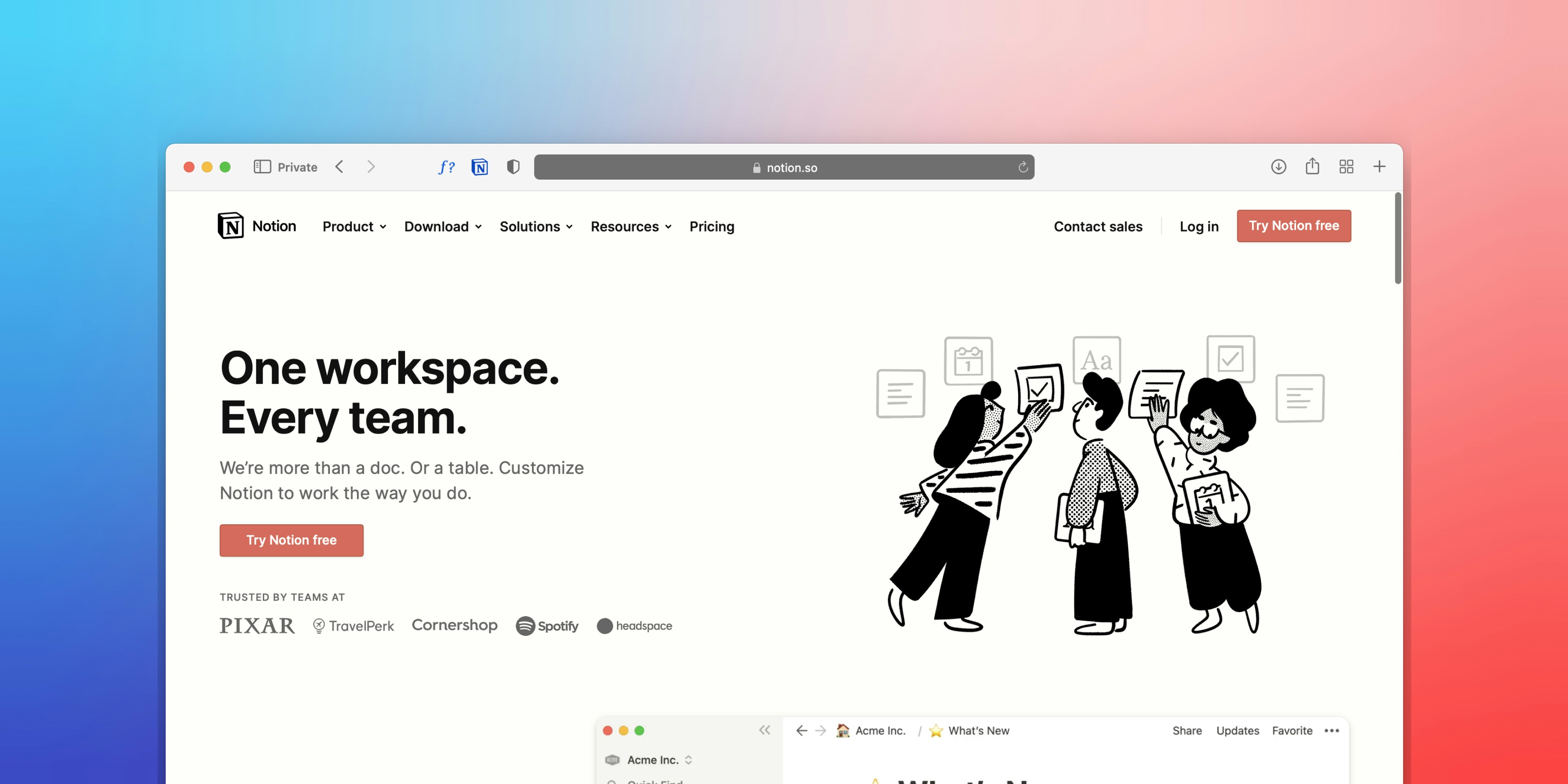What is SaaS?
SaaS, or Software as a Service, is a cloud-based delivery model where applications are hosted remotely and accessed via the internet. Instead of installing software on your own servers or devices, you pay a subscription fee to access it on-demand. Popular examples of SaaS products include Slack, Salesforce, and Microsoft Office 365.
That’s a pretty somber picture, isn’t it? But don’t worry, all is not lost. Now is the perfect time to embrace the change, familiarize yourself with GA4, and start benefiting from its advanced capabilities. Yes, the clock is ticking, but don’t let that create a sense of dread. See it instead as a call to action!
 Notion SaaS Homepage. Photo by Team Nocoloco.
Notion SaaS Homepage. Photo by Team Nocoloco.Advantages of SaaS for Your Business
- Cost Efficiency: One of the most significant advantages of SaaS is cost savings. Traditional software requires purchasing licenses, hardware, and ongoing maintenance, which can be a heavy upfront investment. SaaS, on the other hand, follows a subscription model, spreading costs over time and allowing businesses to scale their software usage as needed.
For small to medium-sized businesses, SaaS can eliminate the need for dedicated IT staff and infrastructure. Whether you’re just starting out or expanding, SaaS can help you avoid large upfront expenses. - Accessibility and Flexibility: With SaaS, your business can access software from anywhere with an internet connection. This means no more being tied to a specific office location or worrying about software installations. Your team can work remotely or on-the-go, boosting productivity and collaboration.
SaaS platforms also allow for easy scalability. As your business grows, you can upgrade your subscription to add more features or users, avoiding the complexity of managing in-house software updates. - Automatic Updates: Traditional software often requires manual updates, leading to downtime and security vulnerabilities. SaaS providers manage updates on their end, ensuring your business always has access to the latest features and security patches. This hands-off approach reduces the burden on your IT department and ensures a seamless experience for your team.
- Security: SaaS vendors are responsible for the security and integrity of their software. Many reputable SaaS providers invest heavily in security infrastructure, which can be more robust than what smaller businesses can afford to implement on their own. With features like encryption, multi-factor authentication, and regular backups, SaaS solutions can provide peace of mind when it comes to data security.
SaaS is the future of software, delivering innovation without the need for complicated infrastructure.
SaaS Use Cases
- Startups and SMBs: For startups and small-to-medium businesses, SaaS is often the ideal choice due to its affordability and scalability. These businesses can leverage SaaS solutions like CRM systems, accounting software, and marketing tools without needing large upfront investments.
- Remote and Distributed Teams: SaaS enables remote teams to collaborate in real-time, making it an excellent choice for businesses with distributed workforces. Tools like Slack, Zoom, and Asana are examples of SaaS solutions that keep teams connected and productive no matter where they are.
- Rapidly Growing Companies: SaaS is ideal for businesses experiencing rapid growth. With scalable solutions, companies can add features, users, and storage as they expand, without the hassle of installing and managing software on their own servers.
 Shopify ecommerce platform. Photo by hookle.
Shopify ecommerce platform. Photo by hookle.Shopify: A SaaS Success Story in E-commerce
One of the most successful SaaS platforms helping businesses thrive is Shopify. Shopify is a well-known SaaS provider in the e-commerce space, enabling small and medium-sized businesses to build and manage their online stores with ease.
By offering a comprehensive suite of tools — from website design to payment processing, inventory management, and customer engagement — Shopify has helped millions of small businesses launch and scale their e-commerce operations.
For many business owners, Shopify’s SaaS platform has eliminated the technical barriers to starting an online store, allowing them to focus on growing their brand and reaching a global audience. Entrepreneurs can set up their store in just a few clicks, without the need for coding or design expertise, and Shopify’s scalability makes it suitable for businesses of all sizes.
Is SaaS Right for Your Business?
The decision to adopt SaaS depends on several factors, including the size of your business, your budget, and your technical needs. If you’re looking for a cost-effective, flexible solution that requires minimal IT infrastructure, SaaS could be the perfect fit for your business. However, if you have highly specialized requirements or need full control over your software and data, traditional software may be a better choice.
SaaS is transforming how businesses operate, providing flexibility, cost efficiency, and scalability. By evaluating your company’s needs and weighing the benefits against potential challenges, you can make an informed decision on whether SaaS is the right solution for your business. Whether you’re a startup or an established brand, SaaS offers a pathway to modern, cloud-powered innovation.
Explore how SaaS solutions can transform your business. Let us help you navigate the SaaS landscape and choose the right platform for your business needs.



Robert Fox
August 25, 2022
Robert Fox
August 25, 2022
Robert Fox
August 25, 2022